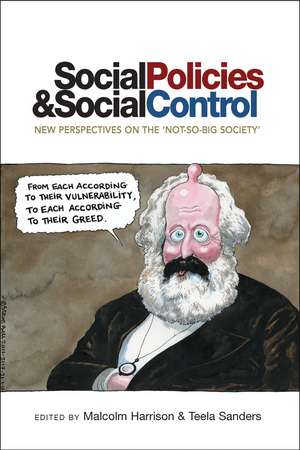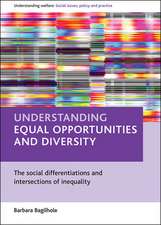Social Policies and Social Control: New Perspectives on the 'Not-So-Big Society'
Editat de Malcolm Harrison, Teela Sandersen Limba Engleză Paperback – 17 noi 2015
This book offers an innovative account of social-control and behaviorist thinking in social policies and welfare systems and the impact it has had on disadvantaged groups. The contributors review how controls have been applied to individuals and households and how these interventions have narrowed social rights. They illuminate the links between social control developments, welfare systems, and the liberalization of economics, and they highlight the negative impact that behaviorist assumptions—and the subsequent strategies that have grown out of them—have had on the disadvantaged. Overall the volume provides a cutting-edge critical engagement with contemporary policy developments.
| Toate formatele și edițiile | Preț | Express |
|---|---|---|
| Paperback (1) | 367.64 lei 6-8 săpt. | |
| Bristol University Press – 17 noi 2015 | 367.64 lei 6-8 săpt. | |
| Hardback (1) | 831.95 lei 6-8 săpt. | |
| Bristol University Press – 27 mai 2014 | 831.95 lei 6-8 săpt. |
Preț: 367.64 lei
Nou
Puncte Express: 551
Preț estimativ în valută:
70.37€ • 76.46$ • 59.15£
70.37€ • 76.46$ • 59.15£
Carte tipărită la comandă
Livrare economică 21 aprilie-05 mai
Preluare comenzi: 021 569.72.76
Specificații
ISBN-13: 9781447310754
ISBN-10: 1447310756
Pagini: 256
Dimensiuni: 152 x 229 x 18 mm
Greutate: 0.45 kg
Editura: Bristol University Press
Colecția Policy Press
ISBN-10: 1447310756
Pagini: 256
Dimensiuni: 152 x 229 x 18 mm
Greutate: 0.45 kg
Editura: Bristol University Press
Colecția Policy Press
Notă biografică
Malcolm Harrison is professor emeritus in the School of Sociology and Social Policy at the University of Leeds, where Teela Sanders is a reader in sociology.
Cuprins
Part 1: Setting the scene
Introduction
~ Malcolm Harrison and Teela Sanders
Social policy and the new behaviourism: towards a more excluding society
~ Malcolm Harrison with Laura Hemingway
Beyond protection: ‘the vulnerable’ in the age of austerity
~ Kate Brown
Part 2: Policies, practices and implications in specific domains
Welfare reform and the valorisation of work: is work really the best form of welfare?
~ Ruth Patrick
Sanctuary or sanctions: children, social worth and social control in the UK asylum process
~ Ala Sirriyeh
New Labour, the coalition government and disciplined communities
~ Andrew Wallace
Young people, education, families and communities: marginalised hopes and dreams?
~ Doug Martin
Choice, control and user influence in health and social care
~ Gabrielle Mastin
Patient responsibilities, social determinants of health and nudges: the case of organ donation
~ Ana Manzano
Nudged into employment: lone parents and welfare reform
~ Laura Davies
Welfare reform and drug policy: coalition, continuity and change
~ Mark Monaghan
Regulating social housing: expectations for behaviour of tenants
~ Jenny McNeill
Part 3: Conclusions
Concluding thoughts: the consequences of a ‘not-so-big society’
~ Teela Sanders
Introduction
~ Malcolm Harrison and Teela Sanders
Social policy and the new behaviourism: towards a more excluding society
~ Malcolm Harrison with Laura Hemingway
Beyond protection: ‘the vulnerable’ in the age of austerity
~ Kate Brown
Part 2: Policies, practices and implications in specific domains
Welfare reform and the valorisation of work: is work really the best form of welfare?
~ Ruth Patrick
Sanctuary or sanctions: children, social worth and social control in the UK asylum process
~ Ala Sirriyeh
New Labour, the coalition government and disciplined communities
~ Andrew Wallace
Young people, education, families and communities: marginalised hopes and dreams?
~ Doug Martin
Choice, control and user influence in health and social care
~ Gabrielle Mastin
Patient responsibilities, social determinants of health and nudges: the case of organ donation
~ Ana Manzano
Nudged into employment: lone parents and welfare reform
~ Laura Davies
Welfare reform and drug policy: coalition, continuity and change
~ Mark Monaghan
Regulating social housing: expectations for behaviour of tenants
~ Jenny McNeill
Part 3: Conclusions
Concluding thoughts: the consequences of a ‘not-so-big society’
~ Teela Sanders
Recenzii
“This unique collection asks important normative and evaluative questions about techniques used to ‘responsibilise’ citizens, illustrating vividly the wider implications of the ceaseless pursuit of moral welfare on arguably the most ‘vulnerable’ groups.”
“This very well edited volume offers a range of new and established voices in the field and presents a penetrating critique of new forms of social control across a range of social policy fields. Opening up new avenues for analysis, the book serves as a wake-up call about contemporary threats to welfare and social solidarity and should be widely read by students, academics, practitioners, and policy makers.”
“This book is greatly to be welcomed. Examining developments in UK social policy during a period of deep crisis, the contributions to this volume remind us that ‘welfare’ is always and forever about politics, power, and control.”
“Social Policies and Social Control offers a text which cuts through a range of policy domains to bring new insights on one cross cutting concept in policy analysis: social control. . . . An invaluable resource for students of social policy. But it also encourages the reader to consider how some of the changes to the presentation of social problems and the policy responses in turn shape how citizens perceive themselves, their communities, and the role of the state.”
"A wake-up call."













